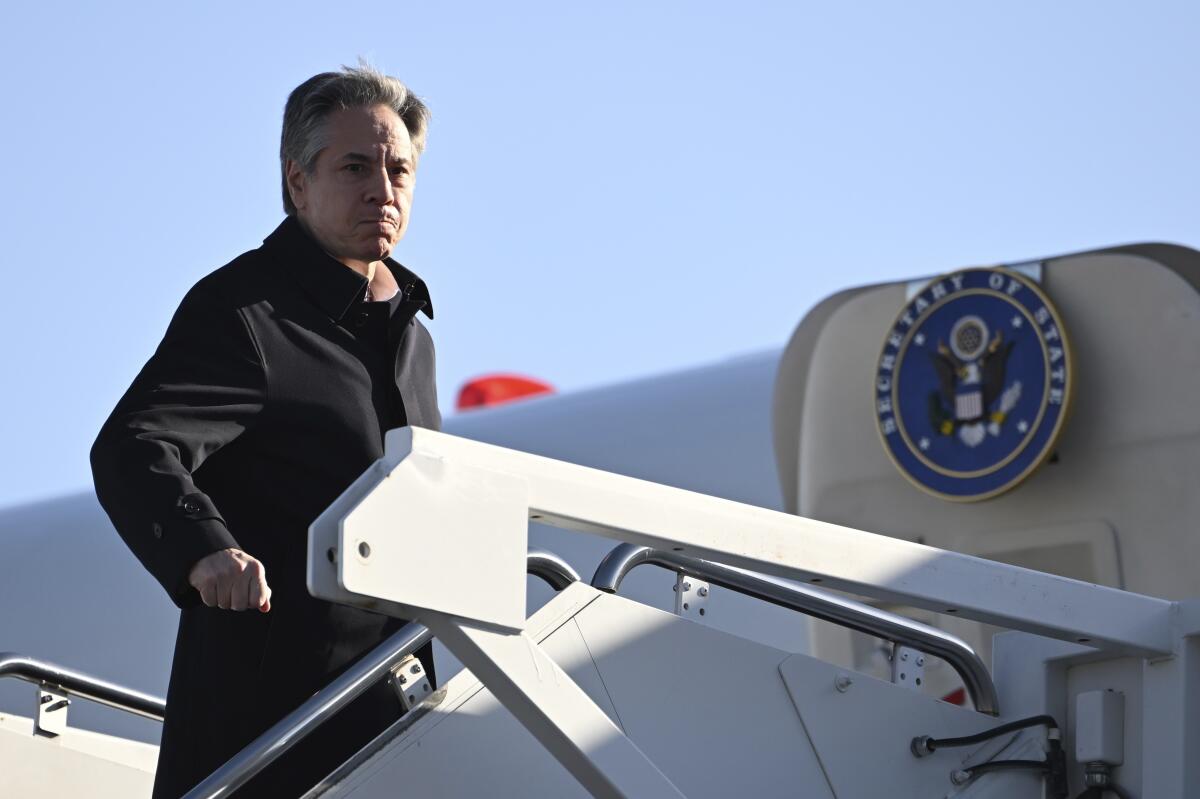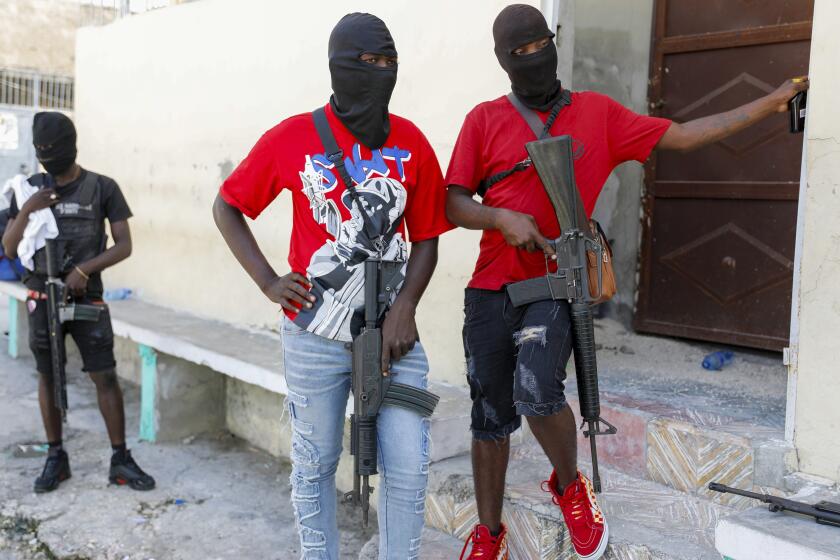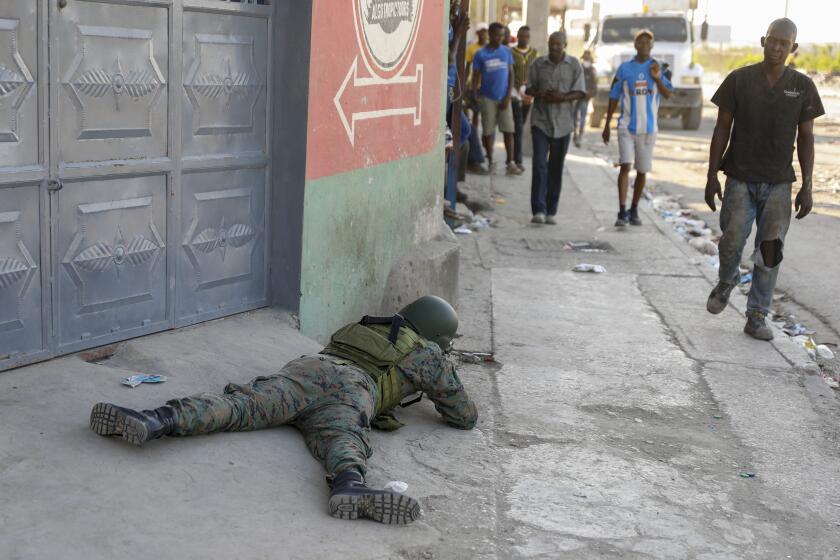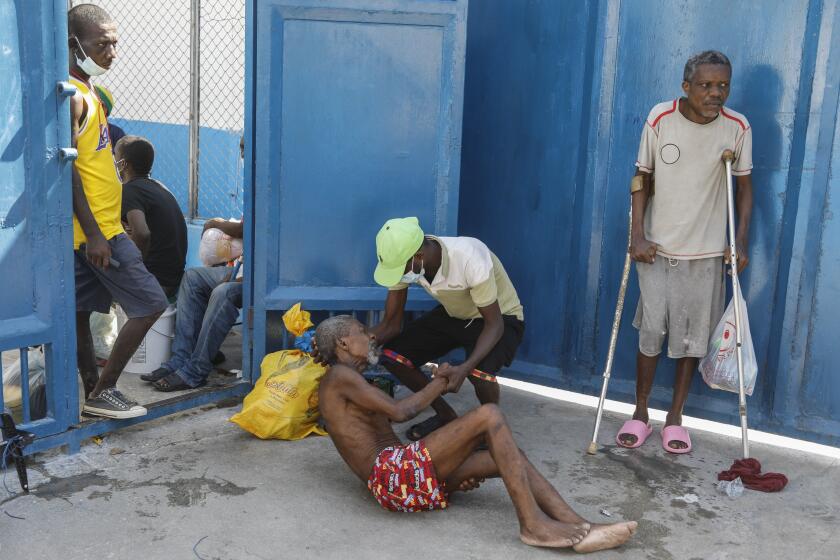Haiti’s prime minister to resign once transition is in place, official says

- Share via
KINGSTON, Jamaica — Caribbean leaders said late Monday that they “acknowledge the resignation of Haitian Prime Minister Ariel Henry” once a transitional presidential council is created and an interim premier named.
The announcement was made by Guyana President Irfaan Ali, who held an urgent meeting earlier Monday in Jamaica with officials including U.S. Secretary of State Antony J. Blinken and members of Caricom, a regional trade bloc. They met behind closed doors for several hours to discuss how to halt Haiti’s spiraling violence.
Henry did not attend the meeting and could not be immediately reached for comment. A spokesman for the prime minister’s office did not return messages for comment.
Before sharing details of the proposed transitional council, Ali said, “I want to pause and thank Prime Minister Henry for his service to Haiti.”
Earlier Monday, Jamaican Prime Minister Andrew Holness said the meeting was a work in progress.
“It is clear that Haiti is now at a tipping point,” he said. “We are deeply distressed that it is already too late for too many who have lost far too much at the hands of criminal gangs.”
Haitian politicians try for a coalition to lead the country out of paralyzing gang violence that prevented Prime Minister Ariel Henry from returning.
Henry, who has faced calls to resign or agree to a transitional council, has been locked out of his country while traveling abroad, due to surging unrest and violence by criminal gangs who have overrun much of Haiti’s capital and closed down its main international airports.
Henry remained in Puerto Rico and was taking steps to return to Haiti once feasible, according to a brief statement from the U.S. territory’s Department of State.
Monday’s meeting was held as powerful gangs continued to attack key government targets across Haiti’s capital of Port-au-Prince. Since Feb. 29, gunmen have burned police stations, closed the main international airports and raided the country’s two biggest prisons, releasing more than 4,000 inmates.
It’s the question on the minds of all Haitians ever since armed gangs plunged the Caribbean nation into near anarchy: Where is Prime Minister Ariel Henry?
Scores of people have been killed, and more than 15,000 are homeless after fleeing neighborhoods raided by gangs. Food and water are dwindling as stands and stores selling to impoverished Haitians run out of goods. The main port in Port-au-Prince remains closed, stranding dozens of containers with critical supplies.
Henry landed in Puerto Rico last week after being denied entry into the Dominican Republic, which shares the island of Hispaniola with Haiti.
When the attacks began, Henry was in Kenya pushing for the U.N.-backed deployment of a police force from the East African country that has been delayed by a court ruling.
A growing number of people have been demanding Henry’s resignation. He has not made any public comment since the attacks began.
The U.N. Security Council on Monday urged Haiti’s gangs “to immediately cease their destabilizing actions,” including sexual violence and the recruitment of children, and said it expects that a multinational force will deploy as soon as possible to help end the violence. It urged the international community to support the Haitian National Police by backing the force’s deployment.
The government said it would set out to find the killers, kidnappers and other criminals who fled after being freed from the two prisons.
Council members also expressed concern at the limited political progress and urged all political actors to allow free and fair legislative and presidential elections.
A U.N. delegation attending Monday’s meeting included the secretary-general’s Chief of Staff Courtenay Rattray, Undersecretary-General Atul Khare, who is in charge of U.N. logistics, and Assistant Secretary-General Miroslav Jenča, who is in charge of the Americas in the U.N. political office.
U.N. Secretary-General António Guterres is calling for the urgent deployment of the multinational force and for the mission to be adequately funded, said his spokesman, Stephane Dujarric.
Currently, funding is at only $10.8 million, with officials in Kenya demanding more than $230 million.
Associated Press writers Dánica Coto in San Juan, Puerto Rico, and Edith M. Lederer at the United Nations contributed to this report.
More to Read
Sign up for Essential California
The most important California stories and recommendations in your inbox every morning.
You may occasionally receive promotional content from the Los Angeles Times.













